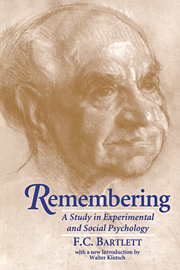Book contents
- Frontmatter
- Contents
- Biography of Sir Frederic C. Bartlett
- Introduction by Walter Kintsch
- Preface
- PART I EXPERIMENTAL STUDIES
- PART II REMEMBERING AS A STUDY IN SOCIAL PSYCHOLOGY
- Chapter XIII Social Psychology
- Chapter XIV Social Psychology and the Matter of Recall
- Chapter XV Social Psychology and the Manner of Recall
- Chapter XVI Conventionalisation
- Chapter XVII The Notion of a Collective Unconscious
- Chapter XVIII The Basis of Social Recall
- Chapter XIX A Summary and Some Conclusions
- Index
- Plate section
Chapter XIV - Social Psychology and the Matter of Recall
Published online by Cambridge University Press: 04 August 2010
- Frontmatter
- Contents
- Biography of Sir Frederic C. Bartlett
- Introduction by Walter Kintsch
- Preface
- PART I EXPERIMENTAL STUDIES
- PART II REMEMBERING AS A STUDY IN SOCIAL PSYCHOLOGY
- Chapter XIII Social Psychology
- Chapter XIV Social Psychology and the Matter of Recall
- Chapter XV Social Psychology and the Manner of Recall
- Chapter XVI Conventionalisation
- Chapter XVII The Notion of a Collective Unconscious
- Chapter XVIII The Basis of Social Recall
- Chapter XIX A Summary and Some Conclusions
- Index
- Plate section
Summary
THE PROBLEM STATED
At present we are not to be concerned with the question as to whether there is any sense whatever in which a social group may, as such, be said to possess a memory. This is a notion which, in one form or another, has been played with by many people and taken very seriously by a few. The most modern form of the idea, and also one of the most difficult to discuss with any clarity, is connected with certain developments of psychopathology. According to these, many of the phenomena of mental disease, as well as those of social reversions, imply the unconscious persistence, in group structure, of practices and beliefs unknown to any individual member of the groups concerned. These are said to make up a “collective unconscious” which may at times powerfully influence social conduct. Such a view will come under discussion later, but we are for the moment concerned only with remembering in the group, and not with any hypothetical or demonstrable remembering by a group.
Nevertheless, it is impossible to discuss the social determination of recall without forming some conclusions about the ways in which important social conditions actually operate. And these conclusions will lead up to a consideration of the question of what conditions of recall are specifically social.
First, then, I propose to consider a few typical cases in which memory appears to be directly influenced by social facts. I shall discuss the psychological explanation of these instances, and, following this, I shall draw certain tentative conclusions bearing upon the psychological significance of social organisation, so far as remembering is concerned.
- Type
- Chapter
- Information
- RememberingA Study in Experimental and Social Psychology, pp. 247 - 255Publisher: Cambridge University PressPrint publication year: 1995



